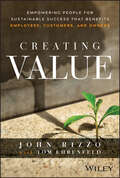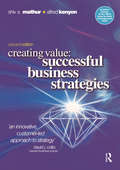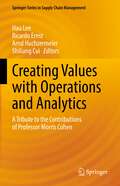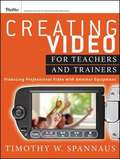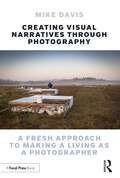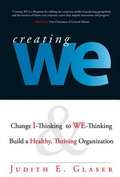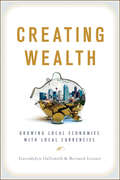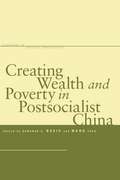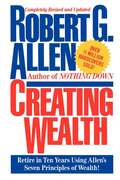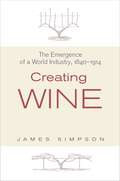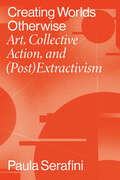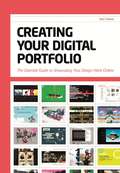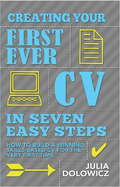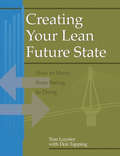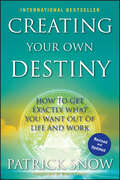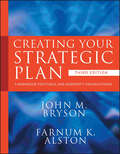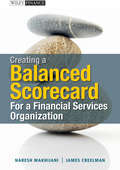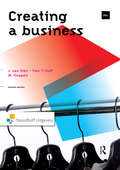- Table View
- List View
Creating Value: Empowering People for Sustainable Success that Benefits Employees, Customers, and Owners
by John Rizzo Tom EhrenfeldGuide to create unlimited value in any organization, supported by rich, granular company stories Drawing from real stories of how companies relentlessly improved quality, delivery, service, and cost structure, Creating Value: Empowering People for Sustainable Success that Benefits Employees, Customers, and Owners offers simple, powerful ways to think and act to unlock the nascent value of any enterprise. This book shares a dynamic business system that, when practiced authentically, taps into a more focused and productive organization to deliver superior value to customers in a way that improves consistently over time. Author John Rizzo draws from 30 years of leading successful business transformations in a wide range of industries. His approach, which creates sustainable success by empowering people to improve processes continuously, features the following principles: Apply a Holistic Business System: Develop a complete framework that integrates strategy deployment, value stream analysis, workshops, and management systems Prioritize People Development: Employ techniques that tap the wisdom of those who do the work—the true source of sustainable improvement Learning as the Foundation: Discover how hands-on improvement creates deeper understanding and represents the most fundamental type of continuous improvement Produce Quality at the Source: Build excellence into processes rather than inspecting for it afterward Leverage the Compounding Power of Improvement: Realize the power of small improvements accumulating into breakthrough performance Creating Value reveals how pursuing excellence leads to outstanding results that endure over years. It is an essential resource for business leaders to dramatically boost employee participation and agency, while steadily increasing profits and boosting enterprise value leading to widely shared creation of value.
Creating Value: Successful Business Strategies
by Shiv Mathur Alfred Kenyon Shiv Sahai Mathur'Creating Value through Business Strategy' is the new edition of 'Creating Value: Shaping Tomorrow's Business', winner of the MCA price for best management in 1997. This new edition provides constructive guidelines to readers to open their minds to the challenges of creating value. It extends and updates the reasons for the choice of the individual offering as the strategy unit and intensifies and extends the challenges to standard approaches and conventional thinking. Updates to all the material from the first edition are included and new examples have been added throughout.
Creating Values with Operations and Analytics: A Tribute to the Contributions of Professor Morris Cohen (Springer Series in Supply Chain Management #19)
by Hau Lee Arnd Huchzermeier Ricardo Ernst Shiliang CuiThis book showcases how the latest and most advanced types of analytical modeling and empirical analysis can help to create value in the global supply chain. Focusing on practical relevance, it shares valuable management insights and addresses key issues in operations management (OM), demonstrating how past research has led to various practices and impacts, while also exploring the aspirations of the latest research. It presents current research on various topics such as global supply chain design, service supply chains, product design, responsible supply chains, performance and incentives in operations, data analytics in health services, new business models in the digital age, and new digital technology advances such as blockchain. In addition, it presents practical case studies on the aforementioned topics.Beyond the value of its contents, the book is intended as a tribute to Professor Morris Cohen, who has been a major contributor to advancing the research frontier in operations management and a driving force in shaping the field.Given its scope, the book will appeal to a wide readership, from researchers and PhD students to practitioners and consultants.
Creating Video for Teachers and Trainers
by Tim SpannausIncorporating advice from message design and multimedia research, this practical guide helps trainers plan, produce, edit, and distribute compelling, professional video, using inexpensive or free consumer-grade equipment and software. Paralleling the work process a teacher or trainer would follow, the guide shows how to "tell a story" that will engage an audience and enables trainers to create instructional videos for a wide variety of uses and traditional and digital media.
Creating Visual Narratives Through Photography: A Fresh Approach to Making a Living as a Photographer
by Mike DavisThis book provides photographers with the foundation to craft more compelling photos from concept all the way through to creation and distribution, on the path to making a living. Based on real-life practice and experience, former National Geographic and White House visual editor, Mike Davis, takes readers on a journey starting with addressing the motivation behind an image and how this determines the rest of the creative process. He goes on to articulate best technical practices to create the narrative through photo composition and what to do with your work after the photos are completed. Each section offers exercises for applied learning and a series of appendices cover assignments structures, a compilation of critical words and concepts, a comprehensive resource guide of organizations, competitions, grants, collectives and agencies, book publishers and printers, and more. This is an ideal resource for students and practitioners alike to gain a more informed understanding of photographic expression and learn how to effectively execute these visions.
Creating We
by Judith E. GlaserCreating WE, by visionary executive coach Judith E. Glaser, goes to the root of the problem in organizations today, illuminating how "I-centric" work environments cause "unhealthy thinking" to form and doom companies to failure. Whether your company has recently been acquired, merged, restructured, downsized, or, in the midst of rapid growth and expansion, has lost the sense of unity it once had, this revolutionary new book shows you how to create healthy work environments and become a "WE-centric" company that achieves extraordinary breakthrough success.
Creating We: Change I-thinking to We-thinking and Build a Healthy, Thriving Organization
by Judith E. GlaserThis revolutionary new book shows readers how to create healthy work environments and become a "WE-centric" company that achieves extraordinary breakthrough success.
Creating Wealth
by Bernard Lietaer Gwendolyn HallsmithLocal currencies have been introduced in thousands of communities around the world in response to the economic crisis because they offer an alternative to money as a way of meeting important human needs. Community leaders can mobilize assets using complementary currencies to address social and economic issues including health care, education, elder care, environmental problems, housing, and food security.
Creating Wealth and Poverty in Postsocialist China
by Deborah S. Davis Feng WangThe Chinese economy's return to commodification and privatization has greatly diversified China's institutional landscape. With the migration of more than 140 million villagers to cities and rapid urbanization of rural settlements, it is no longer possible to presume that the nation can be divided into strictly urban or rural classifications. Creating Wealth and Poverty in Postsocialist Chinadraws on a wide variety of recent national surveys and detailed case studies to capture the diversity of postsocialist China and identify the contradictory dynamics forging contemporary social stratification. Focusing on economic inequality, social stratification, power relations, and everyday life chances, the volume provides an overview of postsocialist class order and contributes to current debates over the forces driving global inequalities. This book will be a must read for those interested in social inequality, stratification, class formation, postsocialist transformations, and China and Asian studies.
Creating Wealth: Retire in Ten Years Using Allen's Seven Principles of Wealth
by Robert G. AllenPopular speaker, multimillionaire, and author of the all-time bestselling real-estate book Nothing Down, Robert G. Allen knows how to bring you financial success. With his seminars sweeping the nation, Allen is at the cutting edge of strategic wealth creation now more than ever. And in this completely revised edition of his classic bestseller Creating Wealth Allen gives you the basic principles that you need to stop thinking poor and start growing rich. Moving beyond just real estate, Allen goes straight to the core of people's inner motivations and beliefs about money to give you all the fundamentals of wealth creation. By developing a wealthy mind-set, anyone can take off into financial self-reliance -- and Allen shows you how. He explains the ways in which most of us have been programmed to think that only saving is good and debt and risk are bad, so that in our efforts to gain security, we cheat ourselves out of getting rich. The key to changing that mind-set is Allen's unique integration of real estate with other wealth-generating investments. In his trademark, easy-to-understand style Allen spells out all his practical applications and shows you how to: Take advantage of recent tax laws Use leverage to multiply holdings while minimizing risks Benefit from high-yield discount mortgages Acquire long-term profits in gold and silver coins Set up corporations and trusts to protect assets Find the highest rate of return with the greatest liquidity As Robert Allen has proved in his own life -- becoming a multimillionaire well before he was thirty-five -- it doesn't matter how much or how little money you have when you start as long as you understand the right principles -- timeless principles that can make you a fortune.
Creating Wine: The Emergence of a World Industry, 1840-1914 (The Princeton Economic History of the Western World #36)
by James SimpsonToday's wine industry is characterized by regional differences not only in the wines themselves but also in the business models by which these wines are produced, marketed, and distributed. In Old World countries such as France, Spain, and Italy, small family vineyards and cooperative wineries abound. In New World regions like the United States and Australia, the industry is dominated by a handful of very large producers. This is the first book to trace the economic and historical forces that gave rise to very distinctive regional approaches to creating wine. James Simpson shows how the wine industry was transformed in the decades leading up to the First World War. Population growth, rising wages, and the railways all contributed to soaring European consumption even as many vineyards were decimated by the vine disease phylloxera. At the same time, new technologies led to a major shift in production away from Europe's traditional winemaking regions. Small family producers in Europe developed institutions such as regional appellations and cooperatives to protect their commercial interests as large integrated companies built new markets in America and elsewhere. Simpson examines how Old and New World producers employed diverging strategies to adapt to the changing global wine industry. Creating Wine includes chapters on Europe's cheap commodity wine industry; the markets for sherry, port, claret, and champagne; and the new wine industries in California, Australia, and Argentina.
Creating Worlds Otherwise: Art, Collective Action, and (Post)Extractivism (Performing Latin American and Caribbean Identities)
by Paula SerafiniExtractivism has increasingly become the ground on which activists and scholars in Latin America frame the dynamics of ecological devastation, accumulation of wealth, and erosion of rights. These maladies are the direct consequences of longstanding extraction-oriented economies, and more recently from the expansion of the extractive frontier and the implementation of new technologies in the extraction of fossil fuels, mining, and agriculture. But the fields of sociology, political ecology, anthropology, and geography have largely ignored the role of art and cultural practices in studies of extractivism and post-extractivism. The field of art theory, on the other hand, has offered a number of texts that put forward insightful analyses of artwork addressing extraction, environmental devastation, and the climate crisis. However, an art theory perspective that does not engage firsthand and in depth with collective action remains limited and fails to provide an account of the role, processes, and politics of art in anti- and post-extractivist movements.Creating Worlds Otherwise examines the narratives that subaltern groups generate around extractivism, and how they develop, communicate, and mobilize these narratives through art and cultural practices. It reports on a two-year research project into creative resistance to extractivism in Argentina and builds on long-term engagement working on environmental justice projects and campaigns in Argentina and the UK. It is an innovative contribution to the fields of Latin American studies, political ecology, cultural studies, and art theory, and addresses pressing questions regarding what post-extractivist worlds might look like as well as how such visions are put into practice.
Creating Your Digital Portfolio: The Essential Guide to Showcasing Your Design Work Online
by Ian ClazieThis book will help graphic designers, illustrators, and other creative professionals navigate the challenge of creating a digital portfolio. It contains practical advice to getting your work into a portable digital format ready to share on the web. It also discusses the thinking behind creating a portfolio, your objectives, and communication strategy.
Creating Your First Ever CV In Seven Easy Steps: How To Build A Winning Skills-based Cv For The Very First Time
by Julia DolowiczThis friendly and accessible book coaches you through the process of writing your first ever CV. You may be in school and about to apply for a part time job; you may be wanting to approach a company for work experience; or you may have been lucky enough to get a job after school without compiling a CV and you want to progress and move on so you need to start from scratch. Creating a first CV, with no employment history, can be a daunting task. But just because you haven't had a work/employment history, doesn't mean you have no skills. However, if you're starting out and you want to stand out, you have to be clear about those skills and make them count. This book breaks down the process of writing your CV into seven steps, short activities that will subsequently be used to build upon each other. It will help you identify those skills - which we all have and bring them to life. Gather it - collect the material for your principal CV and profile. Develop it - start to play with the information you have collected and apply it to two real or dream jobs you would like to apply for. Evidence it - learn how to demonstrate where and how you have ability and proficiency. Shape it - look at the structure, format, style and layout of your CV. Build it - bring together all the information you have collected, expanded, and evidenced so far. Polish it - you will have gathered more information than you ever thought you would, so here you will add and subtract and reshape. Complete it - this final step encourages you to review, refine and rejig your CV so that it reads well and flows There is also a section on writing cover letters, completing an application form and preparing for interview
Creating Your First Ever CV In Seven Easy Steps: How to build a winning skills-based CV for the very first time
by Julia DolowiczThis friendly and accessible book coaches you through the process of writing your first ever CV. You may be in school and about to apply for a part time job; you may be wanting to approach a company for work experience; or you may have been lucky enough to get a job after school without compiling a CV and you want to progress and move on so you need to start from scratch. Creating a first CV, with no employment history, can be a daunting task. But just because you haven't had a work/employment history, doesn't mean you have no skills. However, if you're starting out and you want to stand out, you have to be clear about those skills and make them count. This book breaks down the process of writing your CV into seven steps, short activities that will subsequently be used to build upon each other. It will help you identify those skills - which we all have and bring them to life. Gather it - collect the material for your principal CV and profile. Develop it - start to play with the information you have collected and apply it to two real or dream jobs you would like to apply for. Evidence it - learn how to demonstrate where and how you have ability and proficiency. Shape it - look at the structure, format, style and layout of your CV. Build it - bring together all the information you have collected, expanded, and evidenced so far. Polish it - you will have gathered more information than you ever thought you would, so here you will add and subtract and reshape. Complete it - this final step encourages you to review, refine and rejig your CV so that it reads well and flows There is also a section on writing cover letters, completing an application form and preparing for interview
Creating Your Growth Framework: A Discovery-Driven Approach
by Ian C. Macmillan Rita Gunther McgrathOne of the most common obstacles to a successful growth program is the lack of clarity about the overall strategy at the outset. In order to overcome this obstacle, senior executives need to establish clear, focused guidelines for the pursuit of growth. This chapter considers the growth challenge at the CEO or senior team level as these executives begin to define the growth frame for the entire enterprise. The outcome of this process is a set of propositions about which initiatives will be needed to realistically create growth. As a result, everybody else in the company will be clear about what kinds of growth opportunities are a good strategic fit. This chapter is excerpted from "Discovery-Driven Growth: A Breakthrough Process to Reduce Risk and Seize Opportunity."
Creating Your Lean Future State: How to Move from Seeing to Doing
by Tom Luyster Don TappingMove beyond Value Stream Mapping and Create Your Lean Future In Creating Your Lean Future State: How to Move from Seeing to Doing, Tom Luyster, with Don Tapping, details the implementation of lean after the creation of current and future state maps. This book is a follow-up to the successful Value Stream Management: Eight Steps to Planning, Mapping
Creating Your Own Destiny: How to Get Exactly What You Want Out of Life and Work
by Patrick SnowA motivational speaker and entrepreneur presents the ultimate ten-step road map for personal and professional success! This book is for anyone who wants more out of life. Most people want more time, money, freedom, while other seek better health, deeper love, and more sustainable happiness in life. Creating Your Own Destiny shows you how to get all these things through a simple ten-step step success road map. This book not only helps you soul-search for your true passions, but also provides simple strategies that will help you get what you ultimately what out of life. You will learn how to: -Visualize your desired future and make it your reality -Attain all your dreams while keeping family top priority -Create a winning game plan that fulfills your passions -Build wealth through home-based business ownership -Find solutions for dealing with fear and failure -Gain more time, money, freedom, health, love, happiness -Apply the ultimate success secret in life -Secure personal freedom when you create your own destiny
Creating Your Own Personal Learning Strategy: A Step-by-Step Approach
by Robert J. ThomasA Personal Learning Strategy (PLS) will aid you in the process of learning from experience-especially, though not exclusively, crucible experiences-and it will enhance your ability to adapt to change as a leader. This chapter shows you how to craft a Personal Learning Strategy.
Creating Your Strategic Plan
by John M. Bryson Farnum K. Alston"Creating Your Strategic Plan" is the best-selling companion workbook to Bryson's landmark book, Strategic Planning for Public and Nonprofit Organizations. Whether used with the main text or by itself, this thoroughly revised third edition provides a step-by-step guide to putting strategic planning to work in public and nonprofit organizations. The workbook contains new and revised worksheets and additional material on readiness assessment, teamwork, stakeholder analysis, visioning, strategic issue identification, and implementation. "Creating Your Strategic Plan" covers each of the ten key steps of the strategic planning process and each step description includes sections on purpose and possible desired planning outcomes. The authors provide clear instructions for creating a strategic plan tailored to the needs of the individual organization. The workbook features practical advice to help readers: Refine mission and valuesAssess the internal and external environmentIdentify and frame strategic issuesFormulate strategies to manage the issuesCreate, review, and adopt the strategic planAssess the processFrom setting up the meeting room, to establishing a vision of--and plan for--the future, this indispensable workbook will take readers through every step of the strategic planning process.
Creating a Balanced Scorecard for a Financial Services Organization
by Naresh Makhijani James CreelmanHow to tap the power of the balanced scorecard, for financial services organizationsDesigned to help financial services organizations build and implement the strategic management framework known as the balanced scorecard, Creating a Balanced Scorecard for a Financial Services Organization is the book you need to ensure accountability, transparency, and risk management in your enterprise. The financial crisis revealed the many shortcomings of the industry, but with this book in hand you can make the most of the mistakes of the past to build a better, stronger business that balances both short- and long-term goals.Rich in the latest theoretical thinking and incorporating case studies that show the balanced scorecard system in action, the book covers both financial and non-financial performance perspectives in one comprehensive volume. Written by two leading practitioners with years of real-life experience, the book is the definitive step-by-step guide to implementing the balanced scorecard throughout your organization, aligning your whole business with your strategic goals.Includes everything you need to improve performance transparency, accountability, governance procedures, risk management, and more for financial services organizations of any kindPacked with expert advice and case studies that show the ideas presented in actionWritten by leading experts who have successfully implemented the balanced scorecard system in their own companiesAccessible and in-depth, Creating a Balanced Scorecard for a Financial Services Organization is the book you need to improve your business.
Creating a Brand Identity: A Guide for Designers
by Catharine Slade-BrookingCreating a brand identity is a fascinating and complex challenge for the graphic designer. It requires practical design skills and creative drive as well as an understanding of marketing and consumer behaviour. This practical handbook is a comprehensive introduction to this multifaceted process.Exercises and examples highlight the key activities undertaken by designers to create a successful brand identity, including defining the audience, analyzing competitors, creating mood boards, naming brands, designing logos, presenting to clients, rebranding and launching the new identity.Case studies throughout the book are illustrated with brand identities from around the world, including a diverse range of industries – digital media, fashion, advertising, product design, packaging, retail and more.
Creating a Brand Identity: A Guide for Designers
by Sue JenkynCreating a brand identity is a fascinating and complex challenge for the graphic designer. It requires practical design skills and creative drive as well as an understanding of marketing and consumer behaviour. This practical handbook is a comprehensive introduction to this multifaceted process.Exercises and examples highlight the key activities undertaken by designers to create a successful brand identity, including defining the audience, analyzing competitors, creating mood boards, naming brands, designing logos, presenting to clients, rebranding and launching the new identity.Case studies throughout the book are illustrated with brand identities from around the world, including a diverse range of industries – digital media, fashion, advertising, product design, packaging, retail and more.
Creating a Business
by Jenny van Sten-van't HoffThere is more to setting up a successful business than just a good idea. Creating a Business examines concisely all the relevant aspects: the excitement and satisfaction that business entails, the challenges that face the entrepreneur, the risks that lie in wait. The textbook is organized around a practical example: a company setting out to launch a new line of clothing. Aspects of setting up a business, including management, marketing, legislation, and financial management are examined. Including pedagogical features, such as end-of-chapter questions and illustrations, Creating a Business will interest students of small business and entrepreneurship.
Creating a Business Plan
by Harvard Business School PressEvery business needs a business plan--a plan to meet the expected and unexpected opportunities and obstacles the future holds. This book will help you take a long, hard look at each element of the plan and show you how to communicate the right message to the right people, and maximize the chances of getting your business launched.
